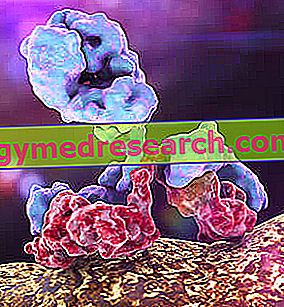What are?
Although it may sound strange, the term immunoglobulin is nothing but a synonym for antibodies ; in essence, they are globular proteins involved in the immune response, that is, in the fight against micro-organisms considered foreign (called antigens).
Immunoglobulins are sometimes called gamma-globulins due to their particular Y-shape.
Synthesis and Mechanism of Action

The plasma-soluble plasma-soluble antibodies do not directly destroy the foreign host, but bind to it to make it more visible and susceptible to action by other actors in the immune system (phagocytes and cytotoxic cells).
To better understand
Imagine a square full of people, among which a certain number of criminals (antigens) are hiding; some gendarmes present in the crowd (immunoglobulins) are able to distinguish ordinary citizens from criminals; as soon as they recognize one, some agents are activated (plasma cells) and start firing thousands of special colored cartridges (antibodies), which go to hit only the bad guys; at the same time the gendarmes alert another group of law enforcement agencies (phagocytes and cytotoxic cells), which - when they arrive in mass on the spot - are able to recognize and arrest the bad guys thanks to the colored spots on their clothes.
Antibody Memory
When an antigen attacks the organism for the first time, immunoglobulins take some time to notice its dangerousness.
However, after the stranger has been eradicated, so-called "memory" cells remain in the bloodstream, which retain the ability to readily recognize the antigen in case it occurs again, producing a faster and stronger response; it is precisely on this principle that vaccinations are based.
Types of Antibodies
Currently immunoglobulins are divided into four general classes: IgG, IgA, IgE, IgM and IgD.
Immunoglobulins A
Immunoglobulins A ( IgA ) are a group of antibodies present mainly in external secretions, such as saliva, tears, genitourinary secretions, intestinal and bronchial mucus, colostrum and breast milk. They represent an important means of defense against local infections, preventing colonization by pathogens.
Immunoglobulins D
The role of immunoglobulin D ( IgD ) has not yet been fully clarified.
Immunoglobulins E
Immunoglobulins E ( IgE ) are associated with allergic reactions; their binding to mast cell receptors causes the massive release of inflammation mediators, first of all histamine. Immunoglobulins E are also extremely important in protecting against parasitic infestations.
Immunoglobulins G
Immunoglobulins G ( IgG ) represent about 75% of adult plasma antibodies and are the fulcrum of secondary immune responses (those that occur in cases where there has already been a previous encounter with the antigen). They have a particularly effective defensive action: they can neutralize different toxins, prevent viruses from colonizing cells and facilitate bacterial phagocytosis. During pregnancy, the mother transmits her IgGs through the placental membrane to the fetus, giving the baby a certain immunity during the first 3-4 months of life.
Immunoglobulins M
The immunoglobulins M ( IgM ) are antibodies active against blood group antigens and are associated with the primary immune response (initial exposure to the foreign organism); they therefore have a low affinity and intervene first in contact with a new foreign organism. Mature B lymphocytes, which have never been exposed to an antigen, are known as "naive lymphocytes" and on their cell surface express only the IgM isoform.
Blood tests
In certain cases, the doctor may prescribe a specific immunoglobulin examination, to evaluate - for example - the levels of certain antibodies involved in a certain disease. Immunoglobulin tests can be useful to determine the cause of liver damage and confirm the suspected diagnosis, or to highlight the presence of particular auto-antibodies involved in an autoimmune disease, in the diagnosis of certain types of cancer or allergies.
Immunoglobulin-based preparations can also be injected to the patient, to increase the proportion of circulating antibodies, for prophylactic purposes (to prevent the onset of certain diseases, such as hepatitis A), during the treatment of acute infections or in case of failure antibody.



